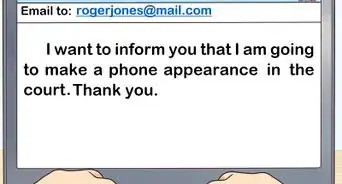wikiHow is a “wiki,” similar to Wikipedia, which means that many of our articles are co-written by multiple authors. To create this article, 15 people, some anonymous, worked to edit and improve it over time.
This article has been viewed 241,852 times.
Learn more...
If you don't want to be served for whatever reason, this article may be able to help you. This article only applies in the United States.
Steps
Doing your research
-
1Research your State rules of civil procedure. Alternatively, research the Federal Rules of Civil Procedure if a Federal matter. Do your homework so that you know what you're up against.
- Whatever document you're supposed to receive, you might get lucky and the court may only require personal service (meaning you, and only you, can be served). Or, the server might be only required to post it to your door.
- Most papers require only what those in the industry call sub-service. This means that whoever answers the door is presumed in charge of your residence and can be served on your behalf. Even if they're uncooperative, the server can serve then as a John/Jane Doe and put a description in his/her affidavit or Return of Service.
-
2Keep in mind that you can be served at your place of employment. When sub-service is allowed, they can either serve the front desk person or someone in charge of the location.Advertisement
-
3Be aware that if service by posting on door is allowed, you cannot avoid being served. In a very few cases, this is valid service. Check the rules in your State.
-
4Be aware that it can be illegal to lie to a law enforcement officer or to obstruct justice. Do so at your own risk.
Where only personal service is allowed
-
1Follow these steps if only personal service is allowed.
-
2Don't answer your door to anybody. Also instruct family, roommates, and kids not to answer the door to strangers.
-
3Instruct the roommates/family to tell the Process Server/Sheriff that the person they're after no longer lives there. This may stop them from coming back. They will usually then write it off as a "non-service" on their proof of service. Whatever you decide to tell them, make sure your stories are consistent.
- If you have visitors, instruct them to call you while they're en route and call when they're at your door. If they're old school and don't have a cell phone or cell coverage is spotty or non-existent, tell them to knock a certain number of times.
-
4Be aware of your surroundings. If you see a suspicious person/vehicle, do not even open your door.
-
5Tell your workplace. When at work, instruct bosses, coworkers, and front desk personnel to tell anyone asking for you that you are unavailable and leave it at that. Also instruct them not to answer any questions but have them just tell the server that they don't know what your schedule is. Of course, this may affect your reputation at work, depending on your role, position and relationship to others at work. That's something you need to consider.
Community Q&A
-
QuestionAt what time of the day can I be served?
 Community AnswerTypically they will try to serve you in the evening when most people are home from work, but it could really be any time.
Community AnswerTypically they will try to serve you in the evening when most people are home from work, but it could really be any time. -
QuestionDoes a server have a deadline to serve me?
 Community AnswerYes, they do. However, they can just file again to serve the person if the first attempt isn't successful.
Community AnswerYes, they do. However, they can just file again to serve the person if the first attempt isn't successful. -
QuestionHow often can a server come to my house to serve me papers?
 Community AnswerAs many times as it takes to execute service. Normally they will not stop until it is served.
Community AnswerAs many times as it takes to execute service. Normally they will not stop until it is served.
Warnings
- In most cases, after the process server attempts service at your residence three to four times, the process server will then file an Affidavit of Non-Service and/or Proof of non-service and mark that they made three to four attempts. With this document, the Plaintiff/Petitioner/Attorney may then convince a judge to approve a motion for alternative service which includes "Service by Publication", which goes in a local newspaper. After you successfully dodge service and service by publication is allowed in your situation, then you need to check all local newspapers every day in the Classified or Legal Section. This is valid service even if you don't ever read the newspaper.⧼thumbs_response⧽
- Speak to an attorney. By all means tell them what's going on. However, tell them that you're specifically interested in how service will work in your situation. Still also do your own research to ensure that the advice you receive is accurate.⧼thumbs_response⧽
- Be aware that if you are using your real life name and information on social media it is possible for you to be served via publication on your social media in some cases.⧼thumbs_response⧽
- Some counties like Pennsylvania for example also have county rules of civil procedure in each county. For example, according to PA rules of civil procedure, a Protection from Abuse Order (PFA) and be served both personally and can be sub-served either by the sheriff or process server. However, in Delaware County, PA, a PFA can only be served personally and only by a police officer or sheriff. County rules sometimes supersede State rules. Research thoroughly and carefully.⧼thumbs_response⧽
About This Article
If you're trying to avoid being served court papers or notices, start by researching your state's rules of civil procedure to find out the different ways you could be served. For example, your state might require that the papers be served to you and only you. In that case, you can avoid answering your door and keep an eye out as you're coming and going from your residence. Other states allow papers to be served to your place of employment, either to you directly, the front desk person, or the manager. You can tell everyone to say that you're unavailable or that you no longer work there, but this may negatively affect your reputation at work. Some states also allow papers to be served by simply posting them on the outside of your door, which really can't be avoided. To learn more about the different ways you can legally be served court papers, read on!




































































